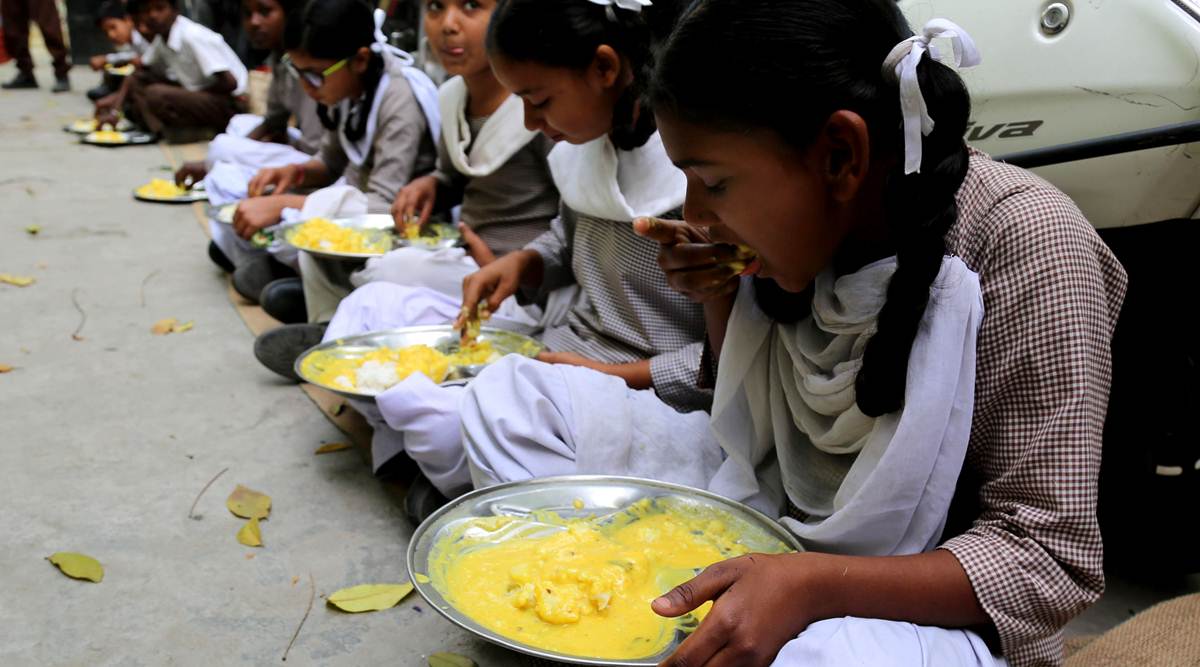Despite opposition, Karnataka govt set to bring eggs on mid-day meal menu
Under the latest proposal, fruits or other alternatives will be provided to those who do not consume eggs.
 Earlier, such supplies were provided to the students during the pandemic period when schools were closed. (Representational/File)
Earlier, such supplies were provided to the students during the pandemic period when schools were closed. (Representational/File)DESPITE OBJECTIONS from some communities and religious groups, eggs are likely to enter the mid-day meal menu in more schools across Karnataka from the next academic session.
The Indian Express has learnt that the BJP state government is planning to scale up a pilot initiative under which eggs were served in seven “backward districts” in north Karnataka between December 2021 and March 2022 to tackle malnutrition among children.
Under the latest proposal, fruits or other alternatives will be provided to those who do not consume eggs.
While the pilot initiative was opposed by various groups, including influential seers of the Lingayat and Jain communities, the state government is learnt to have been encouraged by the largely positive response it has generated among children and parents.
Sources told The Indian Express that the proposal, once finalised, will be placed before the State Cabinet, and that the government will bear the projected cost of around Rs 6.50 per egg. The decision has been conveyed to the Centre, the sources said, adding that the proposal has been placed before the state’s Finance department.
Following Cabinet clearance, Karnataka will become the first major BJP-ruled state to introduce eggs to the menu of the school-lunch programme, a Centrally sponsored scheme, which was renamed as PM Poshan in September 2021. In BJP-ruled Assam, eggs were given previously, too, with one egg per week per child made mandatory in 2021-22.
“The proposal is to provide eggs to children every alternate school day. The official formalities in this regard are at an advanced stage. Even if we are unable to roll out the scheme across the state at once, more districts will be added to the list. A study was undertaken by the state to see the improvement in nutrition levels among children due to the pilot initiative. The results are promising,” an official source said.
When contacted, Karnataka Education Minister B C Nagesh told The Indian Express: “We are thinking of adding more districts where eggs or alternatives can be provided. This is based on the feedback of the experiment in the seven districts. The response was very good in terms of attendance also.”
The Minister said: “You cannot force every child to eat eggs so alternatives are needed. We had requested the Mysore-based Central Food Technological Research Institute to suggest alternatives for those who don’t have eggs. Many suggestions came, including soya, groundnuts, jaggery. This is an initiative to fill gaps in nutrition.”
Significantly, the proposal comes at a time when radical Hindutva groups are pushing their agenda in Karnataka, advocating a boycott of halal meat and a ban on Muslims traders in temple festivals in the wake of a sustained campaign against the hijab in schools and colleges.
The BJP itself has in the past opposed the introduction of eggs in mid-day meals in other states.
In Madhya Pradesh, the Shivraj Singh Chauhan government rolled back the decision taken by the short-lived Congress government under Kamal Nath to introduce eggs in anganwadi meals.
In Chhattisgarh, the BJP had opposed the announcement of the Congress government to introduce eggs as part of supplementary nutrition in schools, forcing the administration to backtrack and announce that eggs will be delivered to homes of children who consume it.
Currently, 13 states and three Union Territories have eggs on their mid-day meal menus: Tamil Nadu (daily); Andhra Pradesh (five days per week); Telangana, and Andaman and Nicobar Islands (thrice a week); Jharkhand, Odisha, Tripura, Puducherry (twice a week); Bihar, Kerala, Mizoram, Uttarakhand, West Bengal, Ladakh, Assam (once a week) and Sikkim (once a month).
In Karnataka, around 14.4 lakh students in classes 1-8 in Ballari, Bidar, Kalaburagi, Koppal, Raichur, Vijayapura and Yadgir districts benefited from the pilot scheme.
According to officials, the previous state government under Congress and JD(S) failed to push through the proposal due to opposition from some sections, such as Sri Pejavar Matha and Lingayat Dharma Mahasabha.
Across states, alternate food items given to students who do not consume eggs include seasonal fruits, bananas and chikki, among others. For egg and its alternatives, which are considered additional food items, states and the UTs bear the entire cost. However, the funding of the pilot initiative in Karnataka was split by the Centre and the state in a 60:40 ratio.
Under PM Poshan, the Centre bears the cost of food grains and their transportation while funds to cover the cooking cost and payments to cooks and workers are split by the Centre in a 60:40 ratio with states and UTs with legislatures.
In 2021-22, out of its total allocation of Rs 10,233 crore for PM-Poshan, the Ministry of Education has set aside Rs 7,412 crore for the cooking cost alone. Currently, the cooking cost per day per child is Rs 4.97 and Rs 7.45 for primary (1-5) and upper primary (6-8) classes, respectively.
According to provisions of National Food Security Act (NFSA) 2013, children studying in classes 1-8 or within the age group of 6-14 years are entitled to one hot cooked meal free of charge every day, except on holidays, in all schools run by local bodies, government and government-aided schools. Last September, pre-primary school children were also brought under the scheme’s ambit.







